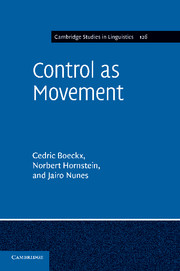Book contents
- Frontmatter
- Contents
- Acknowledgments
- 1 Introduction
- 2 Some historical background
- 3 Basic properties of the movement theory of control
- 4 Empirical advantages
- 5 Empirical challenges and solutions
- 6 On non-obligatory control
- 7 Some notes on semantic approaches to control
- 8 The movement theory of control and the minimalist program
- References
- Index
7 - Some notes on semantic approaches to control
Published online by Cambridge University Press: 07 September 2010
- Frontmatter
- Contents
- Acknowledgments
- 1 Introduction
- 2 Some historical background
- 3 Basic properties of the movement theory of control
- 4 Empirical advantages
- 5 Empirical challenges and solutions
- 6 On non-obligatory control
- 7 Some notes on semantic approaches to control
- 8 The movement theory of control and the minimalist program
- References
- Index
Summary
Introduction
Much of this book has been devoted to a defense of a specific syntactic approach to (obligatory) control. We have provided many conceptual and empirical arguments in favor of a movement-based approach and against the major alternative syntactic treatments reviewed in Chapter 2. In this chapter, we would like to consider the major non-syntactic approaches to control that can be found in the literature and argue that they are inadequate on various grounds. The approaches we will focus on seek to reduce control to selection, or invoke a rich inventory of semantic types or conceptual structures that bypass syntax. Many of the arguments we will produce against such approaches are independent of our favorite syntactic analysis and can be formulated in various frameworks. However, we think that it is when we contrast non-syntactic approaches to control with a movement-based account that the former more clearly reveal their explanatory weaknesses.
The chapter is organized as follows. Section 7.2 discusses some general problems with selectional approaches to control. Section 7.3 focuses on Culicover and Jackendoff's “simpler-syntax” approach. Finally, a brief conclusion is presented in section 7.4.
General problems with selectional approaches to obligatory control
There are several critical features of the interpretation of OC PRO. One of the most obvious is that it requires a local antecedent. Typically, the antecedent is an argument of the embedding predicate (the subject for subject control, the object for object control).
Information
- Type
- Chapter
- Information
- Control as Movement , pp. 210 - 237Publisher: Cambridge University PressPrint publication year: 2010
